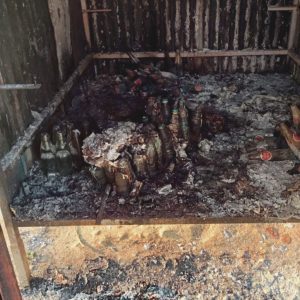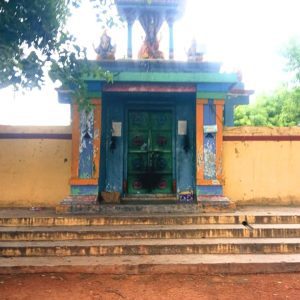
Tamil Nadu: Dalits break 8-decade ban to enter temple; arson, murder threats follow
Temple closure in Tiruvannamalai district renders momentous occasion meaningless; Dalits feel abandoned by authorities

“If they live in their quarters and do not try to enter ours, then we will have no problem. This has been the norm for over a century. So why disturb the equilibrium?”
This was a remark made by a senior leader in Thenmudiyanur village in Tamil Nadu’s Tiruvannamalai district, while expressing opposition to Dalits being granted entry into ‘their temple’.
On January 30 this year, over 200 individuals from Scheduled Castes defied an 80-year-old ban and entered the Sri Muthalamman temple, marking a historic moment celebrated by the media.
Sadly, the festivities were concluded as soon as the photo ops were done. Since that day, for six months now, the temple has been locked and the Dalit community has endured discrimination and boycotts from the dominant caste Hindus.
Also read: Four decades of Dalit struggle behind TN’s ‘thandora’ drum ban
“By shutting down the temple, they have reduced the landmark moment into nothingness,” Murugan, who belongs to the Dalit community, told The Federal. This serves as an example of the government’s failure to offer protection to Dalits who challenged an 80-year-old temple boycott.
Rumblings against discrimination
The village comprises 1,700 families, of which 500 belong to the Dalit community. For over eight decades, the temple was accessible only by people from the Udayar, Agamudaiyar, Reddy, Naidu, Chettiyar, and Vanniyar caste groups. The Dalit community had been petitioning the Tamil Nadu Hindu Religious and Charitable Endowments Department (HR&CE) to intervene and end this regressive tradition.
A peace committee meeting was held on January 25 with representatives from both Dalit and dominant castes. However, it was revealed that the dominant caste groups vehemently opposed the idea, leading to a tense and chaotic atmosphere during the meeting.
Also read: Reviving the legacy of Annai Sathiyavani Muthu, TN’s tall Dalit leader
Speaking to The Federal, Indira, a 45-year-old Dalit community member, recalled: “They spoke to us so sternly that we felt threatened. When we left the meeting, we didn’t take the bus because we were scared that they would harm us. So we went in groups of three on motorbikes.”
Furthermore, they were instructed by authorities not to visit the temple without protection due to reports of potential harm, including the threat of being attacked with chilli powder.
Shop burned down, murder threats issued
Following the photo ops, the police and government authorities left the village, with just one policeman stationed at the entrance of the temple. The Dalit community says it felt forsaken by the authorities, left to confront the subsequent backlash alone.
Indira, who was one of the 12 Dalits who participated in the peace committee meeting, was victim to an arson attack just a week after entering the temple. In the early morning on February 7, her shop was burned to ashes.
Also read: How a Sri Lankan Tamil novel ‘foretold’ Vengaivasal caste atrocity
“Everyone looks at me as though I’ve committed a crime. I don’t go anywhere alone because I am afraid. I have complained to the police but they don’t seem to understand the gravity of the situation. This was a hate crime,” she told The Federal. Ramesh (name changed to protect identity) expressed disappointment that the SC/ST Atrocities Act was not invoked in response to the incident.

Indira’s brother Murugan, 41, who had also entered the temple, alleged that a person from the dominant community had threatened to murder him, following which he lodged a complaint at the local station.
“Do you know why they are segregating us? They want to protect the sanctity of caste because they believe that we are impure. I am an educated man with five degrees, two-time gold medalist and have a respectable job in Chennai. The person who is threatening me is a cow-herder and he tells me that I am lower than him,” he raged.

“If they let the caste structure break down, then what about their power? They need this, to ensure they have authority over others,” he added.
Pollution, puja, and payments
Muthuvel, 30, another Dalit resident, said, “The former panchayat leader said that since we entered the temple, the premises have become polluted and so they need to perform pujas to purify the temple. They told us to offer an apology for entering their sacred space and told us to bear the cost of the pujas.” The caste Hindus denied these allegations.
Several Dalits said that there is heightened tension in the village and that their everyday life has been disrupted. In February, a few grocery shops run by the caste Hindus were shut down in a bid to show their dissatisfaction with the recent events.
Also read | 200 years of Channar Revolt: How Dalit women struggled for right to cover upper body
It’s also alleged that the government-run ration shops were providing rations on separate days to Dalits and people of dominant castes. Muthuvel, who has been working in the ration shop in the area for the past decade, said he has witnessed caste-based discrimination for years, and is a victim, too.
“They said this separation was to avoid any trouble. We then raised the issue with the Tahsildar and now the practice has ended. I am the person who bags the rice at the shop and there have been many times they have called me with vulgar slurs, targeting my caste. I’ve been told to not stand close to people superior to me,” he said.
It was shocking to find out that even today several quarters here follow the double-tumbler system — Dalits and the dominant castes are not served tea, coffee or water in the same set of glasses.
Caste Hindus ‘deeply hurt’ by temple entry
Several villagers belonging to the dominant community told The Federal that this is the first time in 80 years that the temple has been shut.

Nallathambi, a former panchayat leader, said: “Their entry into the temple has deeply hurt us. If everything goes as per usual order, then no one will feel bad. But this temple entry was not something that was normal. We can’t expect everyone from our community to accept this. This isn’t our tradition.”
Murugan, frustrated by the regressive customs, countered: “We Dalits are all well-educated, are working, have built our own houses and our children are studying in good schools. But this is what we face today in our own village.”
Another member of the community said the Dalits had constructed a small temple with the deity Mariamman a decade ago and had been offering prayers there.
“The people of our community facilitated them to build a temple, by providing them land and donations. We let them build a temple exclusively for them, so that we don’t have to ever face this issue. So this is unnecessary provocation on their part to enter our temple,” Nallathambi said. He refuted allegations that the Dalits were being discriminated against in ration shops and other public spaces.
Call for government action
The Federal contacted Sudharshan of the HR&CE department as the temple has been under its control for the last three decades, but he refused to comment on the allegations. “The keys to the temple are with the inspector. There are several internal factors and the law and order situation that we need to consider. We are trying to find an amicable solution and we hope to open the temple soon,” he said.
Murugan had a question for the state government and police: “How is shutting the temple a just solution? Let the doors be open for all. And, if chaos breaks out, let the police investigate and arrest the violator. This will send a strong message that the caste order has been quashed.”
The Federal tried to contact District Collector Murugesh and SP Karthigeyan, but they weren’t available for comment.

